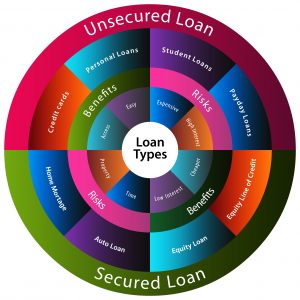Obtaining credit is normally unavoidable during life. Examples of well known types of credit are:
Overdrafts
- Catalogue Debt
- Credit & Store Cards
Loans
- Hire Purchase Deals
Mortgage
For the majority of people the largest, single most important purchase they will ever make, is buying a home – and this usually involves obtaining a mortgage. A mortgage is a debt owed to a lender that has agreed to offer the applicant credit, using property as security.
A mortgage is a loan which will be repaid over a specified period of time. This means that a lender will make checks on the application to ensure that the level of debt, length of time the loan will be repaid, and that the person applying has shown that they are good with money and will do everything in their power to repay what they have borrowed.
To obtain a mortgage and to show the commitment to repaying the loan, the buyer usually has to provide a set amount of money, known as a deposit.


The status of the applicant and the type of property being purchased usually dictates the minimum amount that a mortgage lender will require as a deposit. Adverts show that new build developers normally require smaller amounts for property purchases, and that first time buyers, who are university graduates, will get more favourable rates than other applicants. However, any final decision may be based on your credit report, which is held at credit reference agencies.
Regardless of the kind of credit applied for, ALL lenders will make a credit agency check to ensure that your credit score hits at least their minimum requirements. This is the quickest and simplest way for a lender to confirm that you are the type of customer they are trying to attract. It may not seem obvious, but someone who has no credit history can often find it just as difficult to obtain credit as someone who has a bad credit history. This is because lenders won’t have any historical proof to evaluate as to whether the applicant can repay any credit they obtain.
All credit application contracts contain terms and conditions. One condition which is normally included as standard, is that “if you don’t keep up repayments, the secured asset will be at risk”. So in the case of a mortgage – if you do not keep up your monthly mortgage payments, the bank may apply for repossession to enable them to sell the property in order to recoup their money.
The above condition is also becoming more and more prevalent within “unsecured” credit agreements – and while it is harder for a lender to obtain ownership of a fixed asset which wasn’t used as security against a debt – a court can order possession of an asset to the value of at least what is owed. It is therefore imperative that you keep up repayments on debt.
According to Experian (the UK’s largest credit reference agency) every missed payment will remain on your credit file for 6 years and even a single missed payment can affect your credit rating which in turn can affect your ability to obtain credit.
If you are worried about repossession, and you are within the legally defined legal procedure then your credit rating will more than likely have been affected.
Remember, a lender will look at anyone who has missed a single payment and possibly think twice before offering credit in the future. Therefore, someone who has a repossession order applied to their credit file would normally find that normal avenues of credit are closed to them. Repossession Reverse can help you if your property is under threat of repossession.
